LAVIE
Invest just a few dollars in your studies and ACE all your exams with updated A+ study materials
Get to the top
Stay at the top
- 506
- 0
- 19
Community
- Followers
- Following
10 Reviews received
525 items
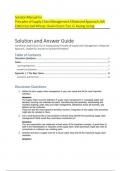
Solution Manual For Principles of Supply Chain Management A Balanced Approach, 6th Edition by Joel Wisner, Keah-Choon Tan, G. Keong Leong
Solution Manual For Principles of Supply Chain Management A Balanced Approach, 6th Edition by Joel Wisner, Keah-Choon Tan, G. Keong Leong-1. Define the term supply chain management in your own words and list its most important activities. Answers: The Supply-Chain Council’s definition of supply chain management is ―managing supply and demand, sourcing raw materials and parts, manufacturing and assembly, warehousing and inventory tracking, order entry and order management, distribution a...
- Other
- • 234 pages •
Solution Manual For Principles of Supply Chain Management A Balanced Approach, 6th Edition by Joel Wisner, Keah-Choon Tan, G. Keong Leong-1. Define the term supply chain management in your own words and list its most important activities. Answers: The Supply-Chain Council’s definition of supply chain management is ―managing supply and demand, sourcing raw materials and parts, manufacturing and assembly, warehousing and inventory tracking, order entry and order management, distribution a...
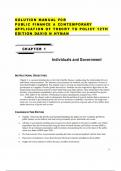
Solution Manual for Public Finance A Contemporary Application Of Theory To Policy 12th Edition David N Hyman
Solution Manual for Public Finance A Contemporary Application Of Theory To Policy 12th Edition David N Hyman-1. My objective in the first lecture is to make it clear to students how economic analysis of the functions and activities of governments fits in with their other courses. Since most students have already had at least one course in microeconomics, I point out how governments can be thought of as agents for supplying goods and services whose quantities have been determined through politi...
- Other
- • 135 pages •
Solution Manual for Public Finance A Contemporary Application Of Theory To Policy 12th Edition David N Hyman-1. My objective in the first lecture is to make it clear to students how economic analysis of the functions and activities of governments fits in with their other courses. Since most students have already had at least one course in microeconomics, I point out how governments can be thought of as agents for supplying goods and services whose quantities have been determined through politi...
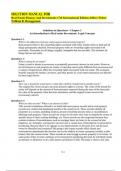
Real Estate Finance And Investments 17th International Edition by Jeffrey Fisher William B. Brueggeman
Solution Manual for Real Estate Finance And Investments 17th International Edition by Jeffrey Fisher William B. Brueggeman-What is the difference between real property and personal property? Real property refers to the ownership rights associated with realty. Realty refers to land and all things permanently attached. Personal property refers to ownership rights associated with personalty. Personalty are all things, tangible, intangible that are movable. This includes all things that are not ...
- Other
- • 326 pages •
Solution Manual for Real Estate Finance And Investments 17th International Edition by Jeffrey Fisher William B. Brueggeman-What is the difference between real property and personal property? Real property refers to the ownership rights associated with realty. Realty refers to land and all things permanently attached. Personal property refers to ownership rights associated with personalty. Personalty are all things, tangible, intangible that are movable. This includes all things that are not ...
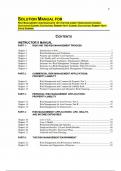
Solution Manual for Risk Management And Insurance 12th Edition James Trieschmann Sandra Gustavson Sandra Gustavson, Robert Hoyt Sandra Gustavson, Robert Hoyt, David Sommer
Solution Manual for Risk Management And Insurance 12th Edition James Trieschmann Sandra Gustavson Sandra Gustavson, Robert Hoyt Sandra Gustavson, Robert Hoyt, David Sommer-1. Risk can be defined as uncertainty as to loss. Risk can create an economic burden by requiring reserve funds to pay for contingent losses and price increases of some goods and services. Risk may deprive society of some goods and services that are determined to involve too much risk to justify their production. 2. a. Pur...
- Other
- • 104 pages •
Solution Manual for Risk Management And Insurance 12th Edition James Trieschmann Sandra Gustavson Sandra Gustavson, Robert Hoyt Sandra Gustavson, Robert Hoyt, David Sommer-1. Risk can be defined as uncertainty as to loss. Risk can create an economic burden by requiring reserve funds to pay for contingent losses and price increases of some goods and services. Risk may deprive society of some goods and services that are determined to involve too much risk to justify their production. 2. a. Pur...
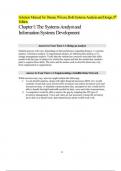
Solution Manual for Systems Analysis and Design, 8th Edition by Alan Dennis, Barbara Wixom, Roberta M. Roth
Solution Manual for Systems Analysis and Design, 8th Edition by Alan Dennis, Barbara Wixom, Roberta M. Roth-Student answers will vary, depending on their preferences regarding being a: 1) systems analyst, 2) business analyst, 3) requirements analyst, 4) infrastructure analyst, or 5) change management analyst. Verify that the student has correctly associated the skills needed with the type of analyst for which they aspire and that the student has created a plan to acquire those skills. The ro...
- Other
- • 335 pages •
Solution Manual for Systems Analysis and Design, 8th Edition by Alan Dennis, Barbara Wixom, Roberta M. Roth-Student answers will vary, depending on their preferences regarding being a: 1) systems analyst, 2) business analyst, 3) requirements analyst, 4) infrastructure analyst, or 5) change management analyst. Verify that the student has correctly associated the skills needed with the type of analyst for which they aspire and that the student has created a plan to acquire those skills. The ro...
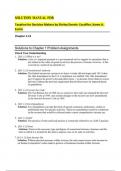
Solution Manual for Taxation for Decision Makers by Shirley Dennis-Escoffier, Karen A. Fortin
Solution Manual for Taxation for Decision Makers by Shirley Dennis-Escoffier, Karen A. Fortin-1. [LO 1.1] What is a tax? Solution: A tax is a required payment to a governmental unit to support its operations that is not related to the value of goods or services the person or business receives. A fine is levied as a result of an unlawful act. 2. [LO 1.1] Constitutional Authority Solution: The federal income tax system as we know it today did not begin until 1913 when the 16th Amendment to t...
- Other
- • 208 pages •
Solution Manual for Taxation for Decision Makers by Shirley Dennis-Escoffier, Karen A. Fortin-1. [LO 1.1] What is a tax? Solution: A tax is a required payment to a governmental unit to support its operations that is not related to the value of goods or services the person or business receives. A fine is levied as a result of an unlawful act. 2. [LO 1.1] Constitutional Authority Solution: The federal income tax system as we know it today did not begin until 1913 when the 16th Amendment to t...
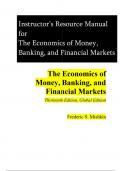
Solution Manual for The Economics Of Money Banking And Financial Markets 13th Global Edition Frederic Mishkin
Solution Manual for The Economics Of Money Banking And Financial Markets 13th Global Edition Frederic Mishkin-1. What is the typical relationship among interest rates on three-month Treasury bills, long-term Treasury bonds, and Baa corporate bonds? The interest rate on three-month Treasury bills fluctuates more than the other interest rates and is lower on average. The interest rate on Baa corporate bonds is higher on average than the other interest rates. 2. What effect does high volatilit...
- Other
- • 236 pages •
Solution Manual for The Economics Of Money Banking And Financial Markets 13th Global Edition Frederic Mishkin-1. What is the typical relationship among interest rates on three-month Treasury bills, long-term Treasury bonds, and Baa corporate bonds? The interest rate on three-month Treasury bills fluctuates more than the other interest rates and is lower on average. The interest rate on Baa corporate bonds is higher on average than the other interest rates. 2. What effect does high volatilit...
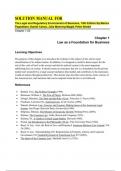
Solution Manual For The Legal and Regulatory Environment of Business, 19th Edition By Marisa Pagnattaro, Daniel Cahoy, Julie Manning Magid, Peter Shedd
Solution Manual For The Legal and Regulatory Environment of Business, 19th Edition By Marisa Pagnattaro, Daniel Cahoy, Julie Manning Magid, Peter Shedd-The purpose of this chapter is to introduce the students to the subject of law and to some classifications of its subject matter. In addition, it is designed to instill in them respect for the role of the ―rule of law‖ in the society and that the judicial system is the most important stabilizing force in society. It should create an awaren...
- Other
- • 398 pages •
Solution Manual For The Legal and Regulatory Environment of Business, 19th Edition By Marisa Pagnattaro, Daniel Cahoy, Julie Manning Magid, Peter Shedd-The purpose of this chapter is to introduce the students to the subject of law and to some classifications of its subject matter. In addition, it is designed to instill in them respect for the role of the ―rule of law‖ in the society and that the judicial system is the most important stabilizing force in society. It should create an awaren...
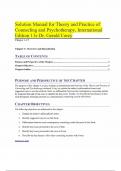
Solution Manual for Theory and Practice of Counseling and Psychotherapy, International Edition 11th Edition By Dr. Gerald Corey
Solution Manual for Theory and Practice of Counseling and Psychotherapy, International Edition 11th Edition By Dr. Gerald Corey-The following outline organizes activities (including any existing discussion questions in PowerPoints or other supplements) and assessments by chapter (and therefore by topic), so that you can see how all the content relates to the topics covered in the text. I. From My Point of View (01.01, PPT Slides 1-6) a. Author’s philosophical orientation is strongly influe...
- Other
- • 46 pages •
Solution Manual for Theory and Practice of Counseling and Psychotherapy, International Edition 11th Edition By Dr. Gerald Corey-The following outline organizes activities (including any existing discussion questions in PowerPoints or other supplements) and assessments by chapter (and therefore by topic), so that you can see how all the content relates to the topics covered in the text. I. From My Point of View (01.01, PPT Slides 1-6) a. Author’s philosophical orientation is strongly influe...
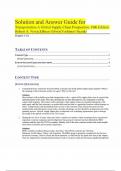
Solution Manual for Transportation A Global Supply Chain Perspective, 10th Edition by Robert A. NovackBrian GibsonYoshinori Suzuki
Solution Manual for Transportation A Global Supply Chain Perspective, 10th Edition by Robert A. NovackBrian GibsonYoshinori Suzuki-Transportation has sometimes been described as the glue that holds global supply chains together. What is the meaning of this statement and do you agree? Why or why not? Solution: Most students will probably agree that transportation is the ―glue‖ of the supply chain since it connects the individual parts of the chain. Still, they should point out that inform...
- Other
- • 77 pages •
Solution Manual for Transportation A Global Supply Chain Perspective, 10th Edition by Robert A. NovackBrian GibsonYoshinori Suzuki-Transportation has sometimes been described as the glue that holds global supply chains together. What is the meaning of this statement and do you agree? Why or why not? Solution: Most students will probably agree that transportation is the ―glue‖ of the supply chain since it connects the individual parts of the chain. Still, they should point out that inform...

Test Bank For Handbook of Informatics for Nurses & Healthcare Professionals, 7th Edition by Toni L. Hebda Melody Rose Kathleen Hunter Patricia Czar
Test Bank For Emergency Medical Responder First on Scene, 12th Edition by Chris Le Baudour Kaitlyn Laurelle Keith Wesley
THE HUMAN BODY IN HEALTH AND ILLNESS, 6TH EDITION BY: BARBARA HERLIHY TEST BANK ISBN: 9780323498449
VATI Care of children Exam Questions & Answers, Rated 100%
TEST BANK The Human Body in Health and Disease 8th Edition by Patton